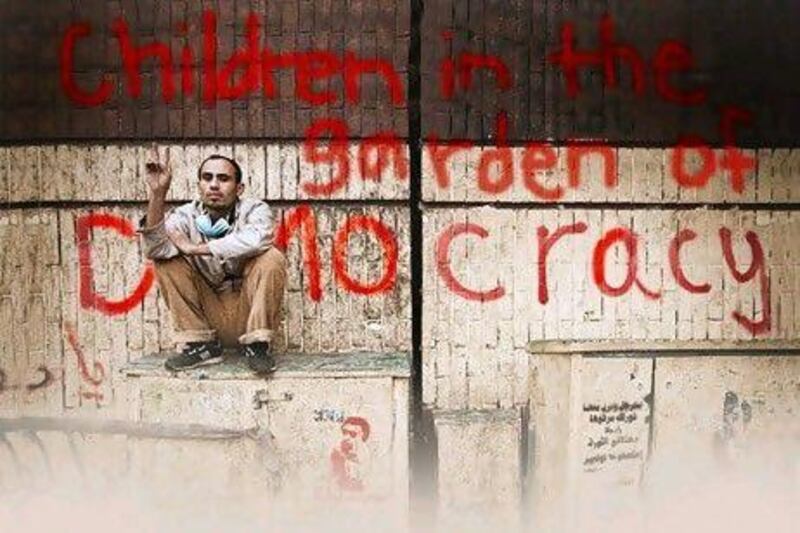The power of the crowd was what defined the Arab Spring, as thousands of protesters successfully overturned unpopular governments in Egypt and Tunisia.
Crowds are now forming online with a different aim - to finance films and articles about the uprisings.
They are doing it via so-called "crowd funding" websites, which have attracted an influx of finance proposals for media projects involving the Arab Spring.
These sites include RocketHub, PleaseFund.Us, based in the United Kingdom, the music site ArtistShare, and Kickstarter, which allows individual backers to pledge any amount from a few dollars to thousands to bring creative ideas to life.
Launched in 2008 by the American internet entrepreneurs Charles Adler, Perry Chen and Yancey Strickler, Kickstarter has made waves in the movie industry.
"Kickstarter has, in a way, revolutionised film financing," says Justin Kramer, a film director based in Doha.
Based in the United States, Kickstarter lists eight projects about the revolution in Egypt. These have attracted US$65,000 (Dh238,758) in pledges, with three having reached their target and received the money.
One film, entitled Children in the Garden of Democracy, has so far raised $4,220 of its $28,900 goal.
Arthur VanWagenen, the US filmmaker behind the documentary, says Kickstarter was an appealing way to raise cash.
"Grant applications can take three to six months, if not longer," he says. "[Kickstarter] was a quick way to scrape together, hopefully, some cash."
His planned movie follows the lives of several Egyptians and has already attracted $70,000 in funding from the University of Tennessee.
Mr VanWagenen is confident that he will raise an additional $28,900 through Kickstarter.
Those pledging $5 via the website will get a thank-you on the film's website. Donation levels and associated rewards rise to $2,500. That gets you an associate producer credit and, assuming that the film is completed, a copy of the movie and VIP pass to the premiere.
Mr VanWagenen has until June 16 to raise the rest of the funds. The money will be handed over to him minus Kickstarter's 5 per cent cut. However, if the project does not hit the $28,900 target, neither Mr VanWagenen nor Kickstarter will receive any cash, and the backers will not be asked to pay the amounts pledged.
"The response has been very good from close family and friends. But it still hasn't spread virally," says Mr VanWagenen.
Mr Kramer turned to Kickstarter to help finance the post-production of his documentary Zabaleen, or "garbage collector".
The film follows a family living in Manshiet Nasser, a slum on the outskirts of Cairo. The area is known as "Garbage City", after the main occupation of the people there - recycling trash.
While the film is not predominantly about the Arab Spring, it does touch on themes surrounding the Egyptian uprising.
Having already sunk $80,000 into making Zabaleen, Mr Kramer and his fellow filmmakers decided to turn to crowd funding to raise cash to complete the project.
They raised $20,199 via Kickstarter, having targeted $15,000.
"People don't have to go and knock on their rich neighbour's door any more to ask for 150 bucks here, and 1,000 bucks there," says Mr Kramer.
He hopes to complete the film in mid-September and submit it to the Sundance Film Festival, which was set up by the actor-director Robert Redford in 1981.
Mr Kramer offered backers of his project specially commissioned works of art, in the hope of attracting more funding.
"Separating someone from their money is a very difficult thing. Especially when you're just saying 'I have this film that's not finished yet … but you have to trust me'," he says.
Kickstarter has also been used to fund media projects after the Arab Spring.
Anne Medley, a photojournalist based in the US, raised $20,348 from 243 backers for a project called Speak Out Tunisia, which aims to teach people there about digital media and online journalism.
But raising money through crowd funding is no easy process.
"The Kickstarter campaign was a stressful time for all of us," she says. "We spent endless hours promoting the project. But in the end, it paid off."
Jabeen Bhatti, an American reporter who is based in Berlin and runs a network of freelance journalists, raised $2,236 on Kickstarter to fund a reporting trip to Tunisia.
This helped to cover travel and hotel costs for two reporters. With stories selling for just $200 or $300, Kickstarter was vital in making such a trip financially viable.
"We had no money," says Ms Bhatti. "Lots of people pledged small amounts, but it's cumulative."
She points out one potential downside to Kickstarter for users in the Arab world - users must have a US-based address and bank account. This means that few in the Arab world are able to use it without help from a US citizen.
"It would be very difficult for you to use Kickstarter if you were not American," says Ms Bhatti.
Despite this, could crowd funding be the future of financing of media projects? "I don't think crowd-sourcing lends itself to every story or every project," she says. "It would have to be something that people care about."
bflanagan@thenational.ae
twitter: Follow and share our breaking business news. Follow us
iPad users can follow our twitterfeed via Flipboard - just search for Ind_Insights on the app.
From revolution to red carpet
With the story of the Arab Spring now finding its way into films and in print, websites uniting patrons of the arts with filmmakers and writers are springing up.

Editor's picks
More from the national




